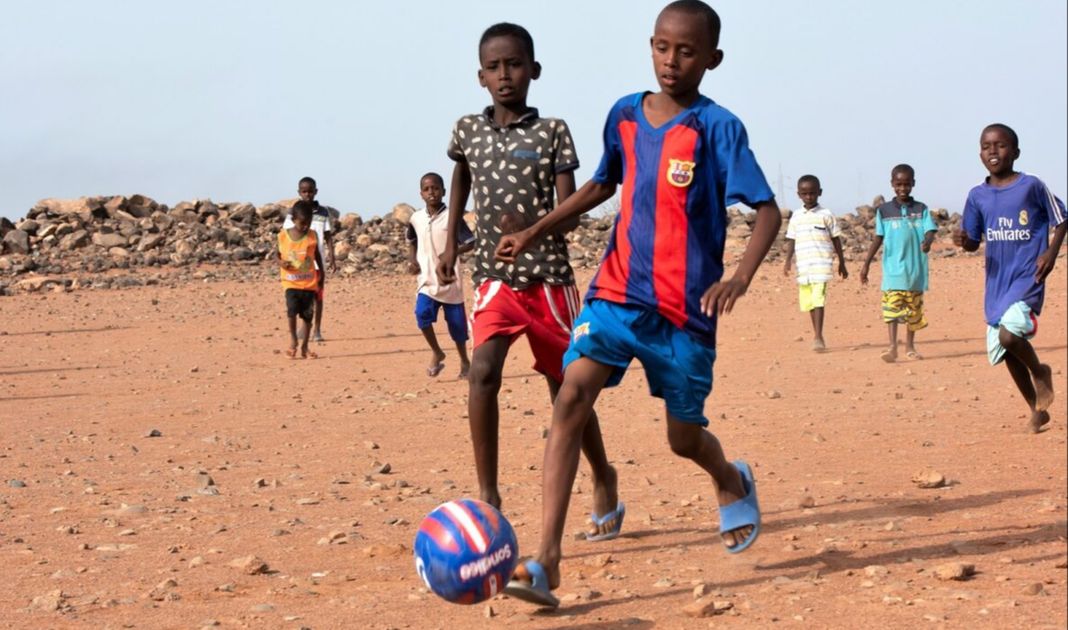Football is the key to Africa

(Photo: US AFRICOM)
Football may be the key to understanding the future of Africa. It gives her a financial kick, pride, and above all it diffuses the public resentment. This is understood by local politicians themselves, who are increasingly willing to let football investments in, and are even willing to participate in them. Business amounting to hundreds of billions of dollars a year is more and more eagerly looking towards the Dark Continent, because it is the last place where you can gain competitive advantage relatively cheaply. The inhabitants of Africa have been waiting for this moment for a long time and train from morning till night. This is the only “conquest” of the continent from which absolutely everyone will benefit. Whoever participates in it has open doors to the most important offices.
Ansu Fati became a global sensation when at the age of just 16 he made his debut in the colours of FC Barcelona and in addition he immediately started scoring goals. The media circulated a picture in which Lionel Messi hugs the young player like a beloved son. On 17th September 2019, during a Champions League match, there was a symbolic change, with the famous Argentinian coming on for the kid from Guinea-Bissau.
In neighbouring France, the 16-year-old Eduardo Camavinga was chosen as Ligue 1 Player of the Month for August 2019. He’d signed a contract with Rennes just a month after his sixteenth birthday, making him the youngest professional in the club’s history. Born in Angola to Congolese parents, Camavinga is today considered one of the greatest talents on the Seine.
These two players are a sign of the times: the academies of European clubs, both the largest and the medium ones, are full of children from Africa, who – already educated in football in Europe – are rapidly paving the way for entry into the professional game. This is a new wave from which there is no escape. The wisest do not run away from it, they just try to jump aboard or even give it the appropriate strength and momentum. Africans are often better physically prepared, faster, more agile and above all more determined than their European peers.
CATCHING UP WITH BRAZIL
For years, the mine of footballing talent was, is and will be Brazil. According to the CIES Football Observatory report of 2019, Brazil’s position as the largest numerical exporter of players by far remains unchanged. As many as 1,330 Brazilians play football professionally outside their homeland; France is in second place (867) and Argentina (820) third. However, it is worth reading these numbers carefully. For example, the favoured destinations for the Argentinians are Chile and Mexico. So while Latin American players travel around the world, but also wander around their own continent, the African people just want to get out of the Dark Continent. Over 80 percent of Nigerians playing outside their homeland play in Europe, while for Argentineans it is just over 30 percent.
Transfers from Africa are, of course, an everyday occurrence. In comparison, 2018 saw Ghana release 39 new professional players into the world, giving it sixth place in the world ranking (first is Brazil with 64 players). In total, 286 Ghanians play professionally in leagues around the world (12th place in the world in terms of the number of exported players). Together with Nigeria (10th place with 361 players), Senegal (16th place with 203 players), Ivory Coast (17th place with 202 players) and Cameroon (20th place with 170 players), this gives a combined total of 1222 players. This means that five African countries already export almost as many players as Brazil, and much more than France and Argentina.
In football, as in any other business, however, everyone is looking for advantages, innovations, emphasis on something that others did not notice or did not have the courage to realise. In the case of African football, there are still several major countries – for example, Nigeria, Ghana, Senegal, Cameroon, Ivory Coast, Mali or South Africa – which are still black holes on the map, not covered by professional scouting networks or training facilities. And talent is everywhere, as exemplified by Ansu Fati from Guinea-Bissau mentioned earlier. He did not get to Barcelona thanks to scouts operating in Africa, but thanks to his father, who emigrated to Spain a few years before the rest of the family to take up work as a refuse collector. It was only when he set aside enough money that he brought Ansu Fati to Europe, and he soon became the object of rivalry between Sevilla, Barcelona and Real Madrid. This shows that even in tiny Guinea – a country with fewer people than Gaza – extraordinary talents can be found.
Due to the fairly low and, above all, uneven level of competition in Africa, transfers of fully-formed players to Europe are not what excites sport directors from the top leagues today. It is more important to capture talented individuals at the earliest possible stage, as well as professionalise on-the-spot training by setting up local departments for their academies. It is in these facilities that you can first select and then educate players. An interesting figure here is Jean-Marc Guillou, a former representative of France and a participant in the 1978 World Cup. He once stated that the European transfer model does not work because clubs only lose money on getting players, and it should be different. He decided that it was necessary to train players, but not in Europe, where the market for this type of service is already very dense and the competition is too high, but in Africa. In Abidjan (Ivory Coast) he founded a football academy – the only professional academy at the time for a population of 15 million.
The turning point was the transfer of Youssouf Fofana from ASEC Mimosas to the AS Cannes team trained by Guillou. Fofana hit the spot and Guillou decided to follow this lead. He went to work at ASEC as a director and trainer simultaneously, introducing his own rules. He transferred the most talented players from his local academy to ASEC, and then sold them on from ASEC to the rest of the world. Suddenly this anonymous-for-Europeans club began releasing other players into the world: Yaya Toure, Kolo Toure, Gervinho, Bakari Kone, Arouna Kone, Lacina Traore, Arunda Dindane, Salomon Kalou, Emmanuel Eboue … and many others. These are all players who have made serious European careers and earning millions in the process. In total, players from the JMG Abidjan academy (from the founder’s initials) changed clubs for hundreds of millions of euros. According to the Financial Times, Guillou initially collected around 7 million euros from investors and after a few years they enjoyed a return on investment of over 200%.
Today Guillou opens (and sometimes closes) other academies: in Mali, Algeria, Ghana, Madagascar, Morocco, Egypt, Thailand, Vietnam … – I am an entrepreneur and I earn money with hard work – he says. In business terms, he is supported by several European clubs, thanks to which he has priority when buying more talented pupils. Among the clubs particularly interested in Guillou’s activities is Arsenal FC.
BLACK POINTS ON THE MAP
Every football scout who goes to Brazil knows how difficult it is to find a good footballer there and how expensive it is. The market is being searched by so many people that the competition between scouts and the clubs employing them is huge, and the players quickly reach very high prices. This game increasingly belongs to such rich clubs as, for example, Ukrainian Shakhtar Donetsk.
(Photo: NASA)
Similarly – only on a smaller scale – this is also the case with several African countries, such as Nigeria and Cameroon. And yet Africa is 54 countries, some completely undeveloped in terms of football infrastructure.
The most interesting case is probably the Democratic Republic of the Congo. Sometimes we don’t realise how much influence this country has on our daily lives. The people of Congo live in extreme poverty, while the country itself is the richest in the world in terms of natural resources ($25 trillion-worth in raw materials). 70 percent of the global coltan resources needed to make cell phones or laptops are found in Congo. This makes the country the apple of the powers of various continents, especially China. It seems that it is in everybody’s interest that the Democratic Republic of Congo does not interest people too much – stay away, be afraid to visit.
Congo also has immeasurable resources of … footballers. Lukaku, Kimpembe, Ndombele, Lukebakio, Kompany, Tielemans, Wan Bissaka – these are just a few players with Congolese roots who are very well known on the European market. At the last World Cup, France had three players of Congolese origin, and Belgium had five. Both teams competed in the semi-final.
It’s a hard-to-talk-about case. These players are admittedly the children of emigrants, but they have shown extraordinary physical abilities, talent and, above all, determination. Red Bull Leipzig, known for its innovative approach to football, have alone acquired two players with Congolese roots for 30 million euros in the last year.
However, there are no players born in DR Congo who would make big careers in Europe, because it is very difficult to leave this country and the local games are totally disorganised and chaotic. But there are exceptions here. VfB Stuttgart contracted 19-year-old Silas Wimangituka for 8 million euros, who until recently was just a street talent in Kinshasa, appearing in a local team and who managed to get to Europe and break through weak French clubs. However, it is shocking that in the country’s capital, Kinshasa, whose population according to unofficial data is growing so fast that it begins to approach 19 million, there is not a single football academy. So it is a completely virgin market and waiting for development, which has not escaped the attention of a group of Polish businessmen. They managed to obtain 13 hectares from the governor of Kinshasa for the construction of the first major academy. The investment is at the planning stage.
Nearly 90 million people live in DR Congo, mostly very young (the average age is just 19 years). Sport is one of the few possible activities, so some say that Congo is “the next Brazil.” Every day, squares and streets are full of kids playing football, an amateur entertainment which takes place everywhere. The best players can count on … food in exchange for performances. The level of their involvement is completely different than in the case of Poles training in domestic football academies. There is also nothing to compare the climate, which encourages you to train 365 days a year.
Just as the country is stratified and local billionaires look from the windows of jumbo-jets at the slums, so is football also stratified. At one end – both geographically and metaphorically – of Congo is TP Mazembe, a football club from Lubumbashi, one of the best and richest in all of Africa. The owner is Moise Katumbi – a billionaire, whose billions cannot be reliably estimated. He just founded a professional football academy and pays a fortune to his players. Only that the distance between Lubumbashi and Kinshasa is the same as between Warsaw and Barcelona …
SOCIAL INVESTMENTS
Importantly, football in Africa gives great joy, and investment in this business – and helping young players realise their dreams of conquering the world – is seen extremely positively. Successful players often change the lives of not only their families, but also friends and even entire towns. They share their wealth, build schools and hospitals, and set up foundations (such as Nwankwo Kanu, the former Ajax, Inter and Arsenal star). That is why every player setting out for the world is treated as a hope for a better tomorrow. In turn, those who leave help are treated with kindness. Sadio Mane, who has just won the Champions League with Liverpool, has opened a football academy in his homeland (Senegal) and would like others to follow in his footsteps. It’s giving away fishing rods, not fish.
Even for players who did not make great careers, but “only” went to the Polish league (such as Abdul-Azis Tetteh), part of the profits are spent on humanitarian aid. So if someone plays football well, the whole environment is pushing him in this direction, because often there is no other chance to get out of poverty. And then anything can happen. George Weah is the only player from Africa who won the Golden Ball, a distinction for the best footballer in the world. He was born in the slums of Monrovia. Today he is … the President of Liberia. First, football gave him wealth, then he became a humanitarian activist, and finally the most important politician in the country. His son, Timothy, also became a professional footballer.
It seems that the real boom for African football is just coming. Champions League winners Liverpool FC had two African players – Sane and Salah, supported by Keita. In addition, four players with African roots. These players not only add quality, but also thanks to their incredible determination, they are able to mobilise European competitors, already full and winners, to work on themselves. More importantly, however, Europe and South America are already saturated with football in many respects – football schools are being created in every town, but often parents are more interested in having children get away from computers for a moment than the children themselves would like. Scouts capture European and Latin talents at a very young age. In Africa, on the other hand, home to several hundred million people … there is no access to professional football (infrastructure, training, selection, transfer possibilities). And today football is the driving force for local communities – the only chance to really change lives. All other paths to the top of the social ladder seem blocked by corrupt elites.
Africa is not a new market, but the market has not yet been fully recognised, unexploited perhaps even at just 30 percent, with unbelievable potential. And since football on a global scale today is a business worth hundreds of billions of euros a year, it will certainly soon turn to more African resources. But like in any business: those who will be the first and the bravest will win a majority of profits.
Autor
Krzysztof Stanowski
Born July 21, 1982 in Warsaw. He started working for Poland’s sport’s daily “Przegląd Sportowy” at the age of 14 – more than 20 years ago. Author of four bestselling books on football. CEO and founder of the Weszło group, with a portfolio boasting sports websites and a radio station.







Trwa ładowanie...